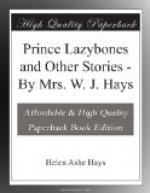“The kingfisher and Arthur then heaped the sea-weed upon the owl, and Arthur, clambering on the rather oily back of the kingfisher, was once again going over the tree-tops.
“Before morning they had reached the desired spot, the flat rock under the chestnut-tree, placed the sea-weed upon it, and, hardly waiting for thanks, the kingfisher left them.
“Arthur thanked the owl warmly, assuring her of his deep gratitude. To which the owl replied, ’You have done me quite as good service, and my thanks are quite as due to you. I return to my empty nest a desolate mother, but never shall I forget your generous sympathy. Possibly I may find consolation, but should I ever raise another brood, it could never equal the beauty of my lost darlings. Alas! we feathered creatures have great trials: we toil diligently for our families, build nests at great cost of time and effort, often to see them swept away by the winds; or, our nests lasting, and unattacked by enemies, many a young bird is thrown to the earth by the violence of storms, and comes to an untimely end through starvation. Sympathy, therefore, we appreciate; it helps us to bear our sorrows with becoming fortitude. Never shall I forget your gallantry, my friend; the thought of it will cheer many a solitary hour when all the world is asleep. I bid you farewell.’ So saying, the owl flapped her wings and was gone.
“Arthur hopped away from the chestnut-tree to the place where he had lost himself. It was early morning, but he was wearied, and slept in spite of all his anxiety. When he awoke he was no longer a frog, but a very hungry boy. The noonday sun was shining, and at his side hopped a little brown bird. It twittered gladly, as if congratulating him, but not one word could he understand. Before this adventure he would have probably frightened it away, but now he reached out his hand softly and stroked its feathers, then seeking berries, he placed them where the little creature could feast upon them. It peered at him with its bright little eyes, and even perched upon his shoulder. Never again did Arthur idly destroy any living creature of the woods—not the humblest weed or flower, bright-winged insect or speckled egg. Nor did he loiter again when sent upon errands. The elves thereafter left him in peace.”
“Good-bye, dear Phil; I am off now. This is my last story.”
“Where am I? Has the music stopped? Was it my wind harp—my poor little wind harp?”
“Why, Phil, your wind harp is broken. Did you not know that it fell from your window last night?” said Lisa, coming into the dining-room.
“No. I wonder if I shall ever see the wind fairy again?”
“Dreaming again, Phil?” said Lisa.
“You always think I dream, Lisa, whenever I speak of fairies.”
“Do I, dear? Well, you must get ready now for Graham; he is coming to take you out on the lake. Miss Schuyler will not be home to dinner, and we three are to have ours on Eagle Island.”




